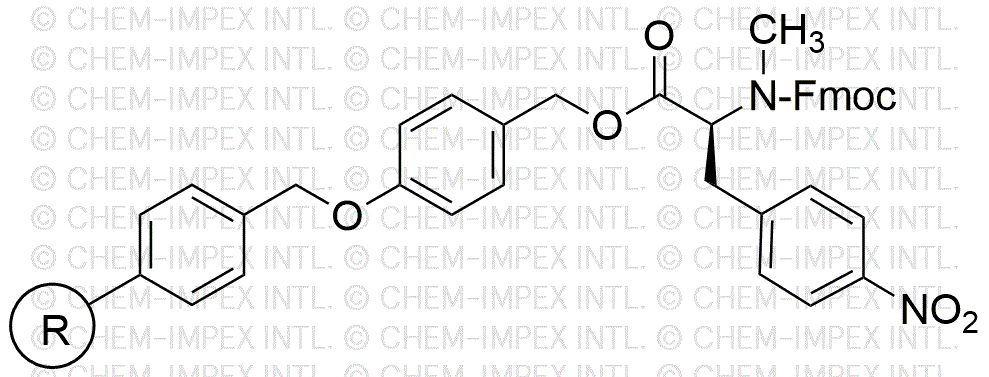Fmoc-N-methyl-L-phenylalanine 4-alkoxybenzyl alcohol resin is widely utilized in research focused on:
- Peptide Synthesis: This resin is essential for solid-phase peptide synthesis, allowing researchers to create complex peptides efficiently. Its structure facilitates the attachment of amino acids, simplifying the synthesis process.
- Drug Development: In pharmaceutical research, this resin aids in the development of peptide-based drugs. Its ability to produce high-purity peptides is crucial for testing and therapeutic applications.
- Bioconjugation: The resin can be used to create bioconjugates, linking peptides to other biomolecules. This application is vital in developing targeted therapies and diagnostics in the medical field.
- Protein Engineering: Researchers utilize this resin to modify proteins, enhancing their stability and functionality. This is particularly important in biotechnology and enzyme development.
- Analytical Chemistry: It serves as a tool for studying peptide interactions and properties, providing insights into molecular behavior that can inform various scientific inquiries.
Informations générales
Propriétés
Sécurité et réglementation
Applications
Fmoc-N-methyl-L-phenylalanine 4-alkoxybenzyl alcohol resin is widely utilized in research focused on:
- Peptide Synthesis: This resin is essential for solid-phase peptide synthesis, allowing researchers to create complex peptides efficiently. Its structure facilitates the attachment of amino acids, simplifying the synthesis process.
- Drug Development: In pharmaceutical research, this resin aids in the development of peptide-based drugs. Its ability to produce high-purity peptides is crucial for testing and therapeutic applications.
- Bioconjugation: The resin can be used to create bioconjugates, linking peptides to other biomolecules. This application is vital in developing targeted therapies and diagnostics in the medical field.
- Protein Engineering: Researchers utilize this resin to modify proteins, enhancing their stability and functionality. This is particularly important in biotechnology and enzyme development.
- Analytical Chemistry: It serves as a tool for studying peptide interactions and properties, providing insights into molecular behavior that can inform various scientific inquiries.
Documents
Fiches de données de sécurité (FDS)
La FDS fournit des informations de sécurité complètes sur la manipulation, le stockage et l’élimination du produit.
Spécifications du produit (PS)
Le PS fournit une description complète des propriétés du produit, notamment sa composition chimique, son état physique, sa pureté et les exigences de stockage. Il détaille également les plages de qualité acceptables et les applications prévues du produit.
Certificats d'analyse (COA)
Recherchez des certificats d'analyse (COA) en saisissant le numéro de lot du produit. Les numéros de lot et de lot se trouvent sur l'étiquette d'un produit, après les mots « Lot » ou « Lot de fabrication ».
Numéro de catalogue
Numéro de lot/série
Certificats d'origine (COO)
Ce certificat d'exploitation confirme le pays dans lequel le produit a été fabriqué, et détaille également les matériaux et composants utilisés et s'il est issu de sources naturelles, synthétiques ou autres sources spécifiques. Ce certificat peut être requis pour les douanes, le commerce et la conformité réglementaire.
Numéro de catalogue
Numéro de lot/série
Fiches de données de sécurité (FDS)
La FDS fournit des informations de sécurité complètes sur la manipulation, le stockage et l’élimination du produit.
DownloadSpécifications du produit (PS)
Le PS fournit une description complète des propriétés du produit, notamment sa composition chimique, son état physique, sa pureté et les exigences de stockage. Il détaille également les plages de qualité acceptables et les applications prévues du produit.
DownloadCertificats d'analyse (COA)
Recherchez des certificats d'analyse (COA) en saisissant le numéro de lot du produit. Les numéros de lot et de lot se trouvent sur l'étiquette d'un produit, après les mots « Lot » ou « Lot de fabrication ».
Numéro de catalogue
Numéro de lot/série
Certificats d'origine (COO)
Ce certificat d'exploitation confirme le pays dans lequel le produit a été fabriqué, et détaille également les matériaux et composants utilisés et s'il est issu de sources naturelles, synthétiques ou autres sources spécifiques. Ce certificat peut être requis pour les douanes, le commerce et la conformité réglementaire.

